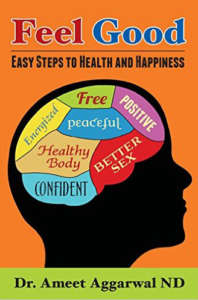Have you ever stopped to think how much your body does for you? It keeps your heart beating, air in your lungs, lets you feel pleasure and pain, and above all, it reminds you how alive you are.
The sad truth is many of us don’t treat our bodies with the respect and care they deserve. And when you fail to take care of your body, everything else suffers.
In the following chapter from the new book, “Feel Good,” author Dr. Ameet Aggarwal ND, naturopathic doctor and psychotherapist, explores the connection between the mind and body—specifically, how revamping your diet and improving your organ health can transform your life:
“To keep the body in good health is a duty…otherwise we shall not be able to keep our mind strong and clear.”
—Buddha
 I spent a lot of time going for psychotherapy and emotional healing with different therapists. It all worked reasonably well; however, there was always an underlying discomfort in my emotions. It was only when I started exercising regularly, treating myself with nutritional supplements and ate foods that were good for me that I began to see permanent results with my emotional strength.
I spent a lot of time going for psychotherapy and emotional healing with different therapists. It all worked reasonably well; however, there was always an underlying discomfort in my emotions. It was only when I started exercising regularly, treating myself with nutritional supplements and ate foods that were good for me that I began to see permanent results with my emotional strength.
Emotional dis-ease is often due to an imbalance of chemicals (neurotransmitters) in your body and in your brain. Most people assume that emotional problems are due solely to chemical imbalances in the brain. Neurotransmitters, however, are produced and balanced by many organs in your body, not only your brain, and mood fluctuations are often a signal of something wrong happening with one of your other organs.
“Helen” came to see me with insomnia, anxiety, and painful and irregular menstrual periods. She was having too much sugar and drank three cups of coffee a day. The coffee was interfering with her liver function, which was affecting her sleep and her hormones (I explain more on this in the chapter “Your Liver and Emotional Wellbeing”). The sugar and coffee were also reducing her feel-good neurotransmitters by ruining her adrenal glands and digestive system, which I explain in later chapters. Her lack of sleep was leaving her exhausted and making her anxiety worse. She ate very few vegetables, which starved her body of good nutrients and damaged her digestive system further, making her health even worse.
We changed her diet by removing coffee and sugar, and increasing vegetables and protein-rich foods such as fish and chicken. We cleansed her liver using herbs and other methods described later in this book. The results were astounding. Her menstrual periods became regular, her menstrual pains disappeared completely, her anxiety vanished, and healthy sleep patterns returned within three weeks. Not only that, her energy levels and concentration improved tremendously, and she was given a promotion at work. Her headaches, which she hadn’t brought to my attention, had also vanished. This is achieving optimal health. Improving your diet and restoring your organ health can have amazing benefits in your life.
We must turn to nature itself, to the observations of the body in health and in disease to learn the truth.”
—Hippocrates
The organs apart from your brain that play an essential role in emotional stability are your adrenal glands, thyroid gland, digestive system, and liver. These organ systems are also crucial to the foundation of your overall health. Keeping them healthy prevents and treats many other diseases, including arthritis, hormonal imbalances, ovarian cysts, fibroids, asthma, eczema, digestive issues, and several other chronic health problems.
There are many factors that directly affect the health of all your organs and the levels of neurotransmitters in your body and therefore influence your emotions. Here are a few:
- Nutrient and vitamin deficiencies, such as vitamin B3, vitamin B6, vitamin B12, vitamin C, folic acid, zinc, essential fatty acids (EFAs), and other nutrients that affect mental health.
- Poor diets, such as too many simple carbohydrates and sugars or too little protein and vegetables.
- Insufficient nutrient absorption because of a malfunctioning digestive system.
- Food intolerances and allergies.
- The amount of exercise you do. Regular exercise reduces depression and anxiety by increasing neurotransmitters in your body and increasing oxygenation of your brain and your organs.
- Blood-sugar balance. Unstable blood sugar often causes feelings of anxiety or depression, especially when not enough sugar feeds your brain.
- Hormonal imbalances caused by external estrogens, birth control pills, and water toxicity.
- Environmental and heavy metal toxicity such as lead, copper, mercury, aluminum, pesticides, and chemical toxicity.
Dr Ameet Aggarwal ND is a naturopathic doctor and psychotherapist (Gestalt, Family Constellations, EMDR) with years of experience treating physical issues, anxiety, stress and depression. His online course on using the five pillars of health, (free videos on health.drameet.com), lecturing around the world and being voted one of the top five speakers on two world summits has earned him the recognition as one of the top 43 naturopaths to follow. His book Feel Good (free chapters on drameet.com/feel-good-book) is considered as one of the most comprehensive guides to anxiety and depression.

Rose Caiola
Inspired. Rewired.



